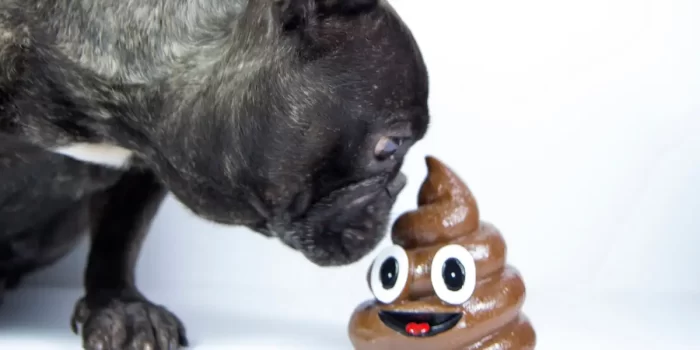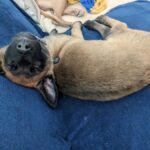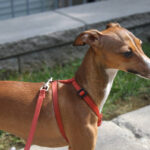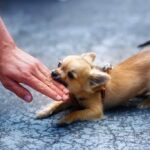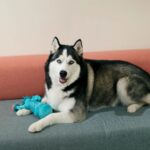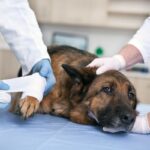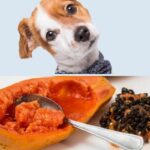It’s a common and frustrating problem – your dog keeps seeking out and eating poop, a behavior known as coprophagia. Not only is it pretty gross, it can also spread parasites and bacteria, making your dog sick. So why do dogs eat poop and how can you get them to stop? In this article we talk about How to Stop a Dog From Eating Poop.
Table of Contents
Why Dogs Eat Poop?
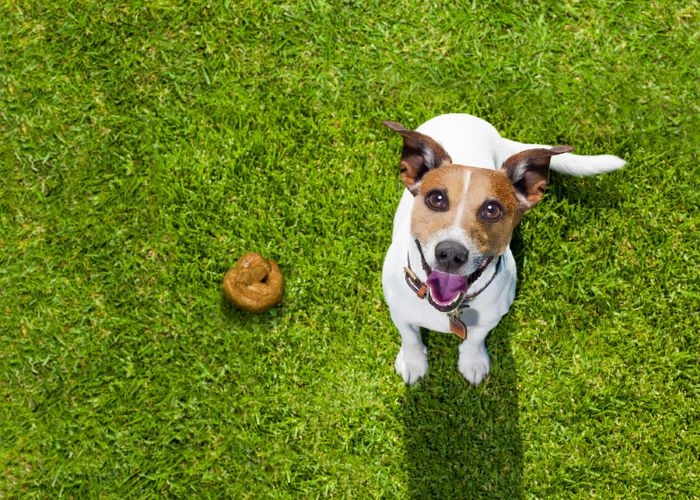
There are a few possible reasons why dogs eat poop:
- Nutritional Deficiency – A lack of certain nutrients like vitamin B or enzymes can cause pica (eating non-food items) and coprophagia. Providing a balanced diet tailored for your dog’s needs can help.
- Natural Scavenging Instinct – As scavengers by nature, some dogs may simply view feces as food. This is especially true of stool from herbivore animals like rabbits.
- Attention-Seeking – Some dogs learn that their humans react strongly when they eat poop. They continue the behavior to get attention, even if it’s negative.
- Stress or Anxiety – High stress levels may cause dogs to develop obsessive behaviors like poop-eating. Managing stress and providing enrichment can help.
- Medical Conditions – Conditions like diabetes, thyroid disorder, pancreatitis or gastrointestinal disease can cause increased appetite, pica and coprophagia. See your vet to rule these out.
- Boredom – Dogs left alone for long periods with little stimulation may eat poop to occupy themselves. Ensuring proper exercise, play and bonding time is key.
How to Stop Your Dog From Eating Poop
Here are the most effective methods to stop coprophagia:
Supervise and Redirect
The simplest approach is to keep your dog leashed when outside to avoid the behavior and redirect them when they go for poop. Reward them with treats when they leave the area. Never punish or yell at them, as this can reinforce the behavior.
Clean Up Poop Promptly
Pick up poop from your yard as soon as your dog defecates to remove the temptation. Consider fencing off parts of your yard if it’s large. When on walks, carry bags to immediately remove any poop.
Add Enzyme Supplements
Digestive enzymes or probiotics can help improve digestion and nutrient absorption. This reduces cravings for poop. Speak to your vet for supplement recommendations.
Improve Their Diet
Make sure your dog eats a premium quality food appropriate for their age, breed size and activity level. Avoid fillers, by-products and artificial ingredients. Discuss optimal nutrition for your dog with your vet.
Increase Exercise and Play
Ensure your dog gets at least 30-60 minutes of vigorous exercise like running, hiking or playing fetch daily. Mentally stimulating games are also important to prevent boredom. Try food puzzle toys, sniff games and obedience training.
Manage Stress and Anxiety
Help high strung dogs relax by providing a predictable routine, playing calming music, using calming scents like lavender and giving relaxing massages. Anxiety medication may also help after consulting your vet.
Use Aversives
For persistent poop eating, try remote-activated citronella or ultrasonic anti-bark collars. They can be triggered to interrupt and deter the behavior. Never use electric shock collars.
Consider Behavioral Therapy
For challenging cases, consult a professional dog trainer or behaviorist. They can assess your dog’s underlying motivation and customize a training plan using positive reinforcement, management and behavior adjustment techniques.
Preventing Reinfection
To fully resolve coprophagia, you must also eliminate reinfection from contaminated areas. Here’s how:
- Use an enzymatic cleaner, not bleach, to remove residual smells that can attract your dog back to the area. Rinse thoroughly after use.
- Cover poop spots like land mines in your yard with obstacles like plant pots or pinecones to remind you to promptly clean.
- Quarantine dogs with contagious parasites like Giardia so they can’t spread infection through the stool. Follow your vet’s treatment guidelines.
- Make sure other neighborhood dogs aren’t soiling your yard at night. Install motion sensor lights and fences if needed.
The Bottom Line
Breaking a poop-eating habit takes diligence, but it’s doable. Supervise your dog closely, optimize their diet, increase exercise, manage stress, use deterrents if needed and thoroughly clean previously soiled areas. Working with a trainer can also help implement effective training techniques. With time and patience, you can curb coprophagia for a happier, healthier dog. I sincerely hope you find this “How to Stop a Dog From Eating Poop” article helpful.
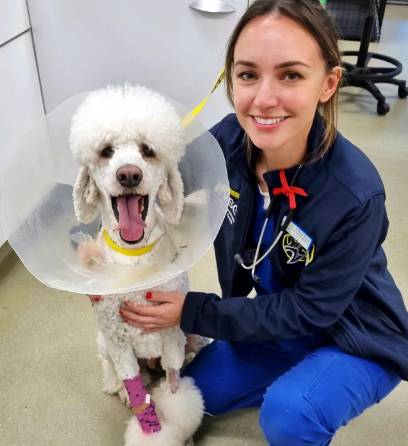
Dr. Kate Bruce is a highly experienced veterinarian with a Master’s degree in Veterinary Medicine and over a decade of expertise in animal behavior and holistic pet care. She combines traditional and modern practices to offer exceptional advice on pet health and wellness. Explore more at petsconsultancy.com and follow her on Instagram for expert tips.

